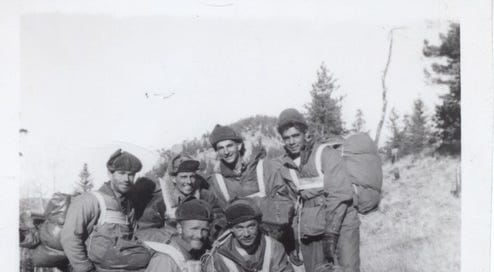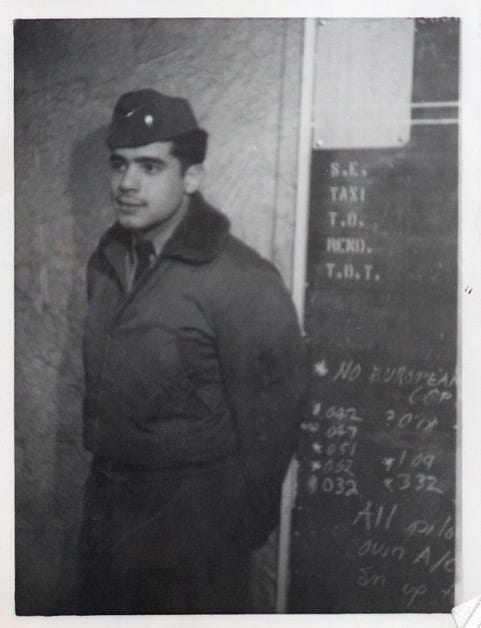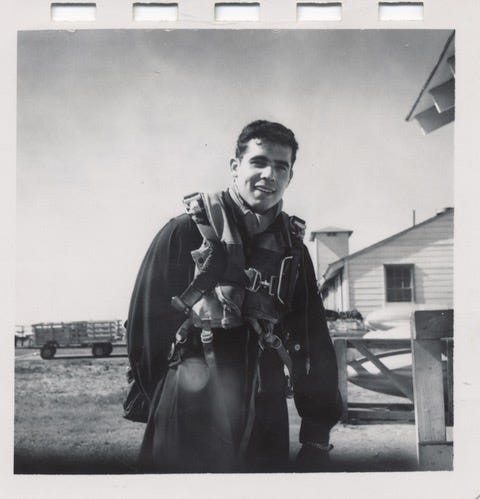Well, it’s time for church:
Although, at days end, it was time to relax, let off steam. If things went well during the day, after hours was your time, and Manston meant religion: “There was a hotel called St. Mildred’s. It was nice. The hotel was only opened in the summertime. In the winter, the bar would open two or three times a week. On Thursday, Friday, [and] Saturday nights they had a dance band. We used to call it ‘church.’ We’re going to church. Everyone went there and had drinks and danced if they had a girl, all that kind of stuff. There were girls there you could dance with, and it was crowded. A lot of people would go to see what this was all about, but we called it ‘church.’” - Roland X. Solis
Anyway, “church” wasn’t church like we think, but it looked good in letters home. At work, Chico still contended with Bill Young while he looked to wash him out and going to “church” could have been the ticket. In the 1950s Air Force, officers and enlisted did not mix in social functions. On base, they had officer, NCO, and enlisted clubs. All were stand-alone. A form of segregation, only legal. Ranks interacted at work, but after hours, off limits, making church the potential for trouble:
“One night, three or four of us were up in Margate having beers. St. Mildred’s was crowded, and we were in civilian clothes. We were upstairs in the bar, and it was my turn to buy a pitcher of beer. As I went to the bar, there were two guys and two girls sitting at the table behind us. Well, one of the girls got up to follow me and asked me to get her out of there because the guys wanted to go to bed and she said they were not those kinds of girls. I responded, ‘If you’re not, you shouldn’t be here.’
I went, bought a pitcher, returned to the table, and sat down. That was all, that’s as far as it went, but one of the guys saw us talking and wanted to fight. I said, ‘No, I don’t want to fight, and besides, I’m an officer.’ He kept at it, so I left. I went down the street and walked around the block hoping I’d cool off and he’d cool off. I went back in about twenty minutes.
There he was, standing at the top of the stairs waiting for me, looking for a fight. Finally, I told him again, ‘Look, I’m an officer. I do not want to fight.’ He kept at it, and I finally said, ‘Okay, you want a fight, throw the first punch. I’ll finish it.’ We were going down the stairs, and some master sergeant took him aside and away. He claimed I never pulled out my ID card. He kept telling the master sergeant he did not think I was an officer but thought I was a two-striper he recognized off the flight line.
The next morning, before the master sergeant showed up, Bill Young pulled his regulations manual out and had me sit down on a footlocker to read it and show cause why I should be retained in the Air Force because of my conduct. Then the master sergeant came in and told the squadron commander what had happened. That’s the only thing that saved my butt, because no matter what I said, Young would not believe me until that damn master sergeant got there and relayed what had happened and what he had seen. Young thought I disobeyed a lot of orders. That was another reason he made me read the regulations.” - Roland X. Solis
Well, “church” became famous, drawing even more crowds wanting to meet fighter pilots. Locals wanted to witness the action and mingle. Single women looked for husbands, while husbands looked for … and, then things got out of hand. Chico just tried to save his career: “Some of the guys started having steady girlfriends. They didn’t tell them they were married. One night a group of newspaper reporters went to St. Mildred’s from London. They heard about church and the Americans. At first, it was anybody would go. Then little by little, it became a pilot’s hangout. They heard about the fighter pilots at St. Mildred’s from Manston, so they started interviewing people and interviewed some of the girls. The girls talked about their boyfriends and how they hoped to get married and hoped that things would go well. Anyway, the article made it into the London papers and then it went in the Albany, Georgia, paper. Some marital problems transpired for officers that were caught by the newspaper story. It was a tense time for a while.” - Roland X. Solis
While church left some pondering fate, another aspect of training was gunnery. Doing well gave pilots tarmac cred. Bragging rights! Live fire allowed one to see how well he could hit targets and desensitize killing. Before flying, pilots had guns loaded, charged, and made ready. On April 17, Chico discovered the true meaning of redundancy … of paperwork:
Statement of Roland X. Solis:
At approximately 0915Z, 17 April 1951, I was taxiing to takeoff position on runway 29. At approximately 200 feet from the lead aircraft, I started to apply brakes at which time I found I had no braking action from my right brake. I then applied the left brake trying to swing the aircraft to the left and behind the lead aircraft, but the left brake failed to hold also. I then tried applying power and pumping hard on the right brake, but it was too late to avert the accident.
Statement of Albert B. Smiley:
At approximately 0915Z, I was leading a flight of three aircraft onto runway 29 for takeoff on an aerial gunnery mission. I got clearance from the tower to take the active. I then taxied out to the center of the runway and down it approximately 150-200 feet. I then brought my aircraft to a stop. I looked around for my two wingmen and saw one aircraft on my left practically in position. The one on my right had just begun to come into my line of vision. I glanced at my instruments and started to give the signal for advancing to takeoff power at which time I felt a jolt on my right side which cocked my aircraft around to about a 45-degree angle to the left. I looked over to see the cause of the jolt and saw the left wing of my number two man interlocked with my right wing with fuel coming from both tips. I gave him the signal to shut down and did so myself.
The result: 1. That the facts surrounding this accident be brought to the attention of all pilots.
Fortunately, Bill Young had PCSd (permanent change of station), and Don Booty was in command. Now, with flying, briefings were part of the regimen. Sometimes they were mission critical, and pilots participated. Command made certain all performed, but who wanted a briefing when not mission critical. Who needed lessons in how not to hit someone on the flight line? Basic flight training taught pilots to “taxi safely, use proper power settings,” and cautioned against “hurried operation of aircraft on the ground.” Well, because of Chico, every pilot retrained on the proper way to taxi an airplane: “The flight line accident was my fault. I was number four in a flight, and we were going to gunnery camp on a gunnery mission. They were having a problem with my guns: Loading them on the end of the runway and charging. The other two guys were already on the runway waiting. Lead was saying, ‘Come on; hurry up; we’ve got to go. If you’re not going to make it, let me know and abort.’ Just then, they gave me a thumbs up and closed the hatch on the guns, so I gunned the throttle. It was hot, the tar was melted. When I made the turn—all that power—I didn’t make enough of a turn, and my tip tank hit the aileron of the airplane I was flying up with. I got an Article 15 and a $150.00 fine.” — Roland X. Solis






V ery good stories and good insight into your father